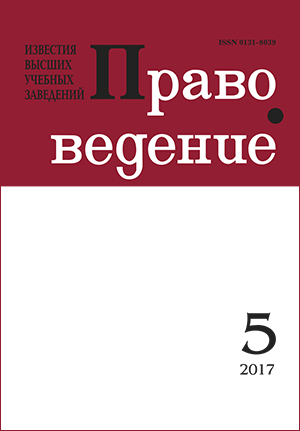Juridical science in anticipation of changes
Abstract
The author shows the changes that occurred in the modern juridical science in the late 20th — early 21st century. These changes are associated with transformation of values and the type of the society. In connection with the social transformations, the state of the juridical science is also changing. The modern juridical science is characterized by methodological pluralism arising out of acknowledgement of limitations of the human mind. As a result, the science is losing its privileged epistemological and social status. The science does not know and cannot know all answers to the questions of life. However this does not mean scientific recommendations do not have any meaning. These conclusions are confirmed by the survey of experts conducted by the author. The author considers the antinomy of autonomy of the juridical science and its connection with the power. Jurisprudence should be in demand by the society and the power. However, there is a risk that the science can turn into a tool of legitimizing the existing status quo. The author concludes that the juridical science should be evaluated by experts under control of the civil society. The modern juridical science has to be pluralistic. Only a pluralism of approaches can produce scientific novelty. Journal “Proceedings of Higher Educational Institutions. Jurisprudence” conducts the policy which promotes the development of new juridical concepts.
Keywords:
legal science, state of the legal science, expert opinion, methodological pluralism, science and power, conceptual scientific novelty
Downloads
References
Downloads
Published
How to Cite
Issue
Section
License
Articles of "Pravovedenie" are open access distributed under the terms of the License Agreement with Saint Petersburg State University, which permits to the authors unrestricted distribution and self-archiving free of charge.




